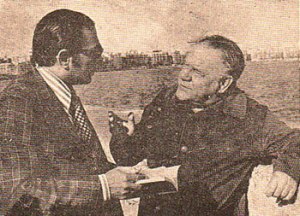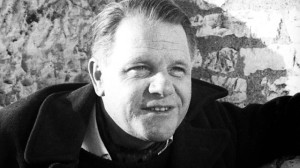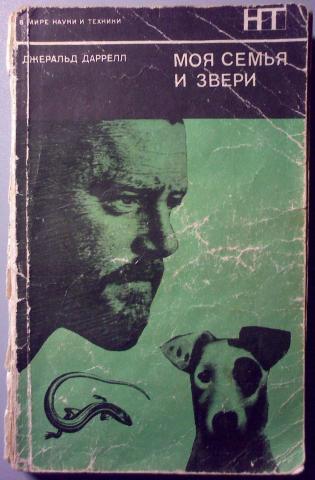The Huffington Post has reprinted a letter from P.G. Wodehouse to Lawrence Durrell, in which the former explains how Jeeves came into being. Durrell was a great admirer of Wodehouse.
Tag Archives: Durrell
(Lawrence) Durrell in Russia, and why Alexandria is like Odessa
I’d recommend heading over to Michael Haag’s blog here and reading his new post on Russian editions of the Alexandria Quartet, where he has shared has some lovely pictures of the covers as well as background on the Quartet in the former USSR.
Since we’re talking about the elder Durrell in Russia, Russian-speakers may be interested to read/watch this interesting round table chat on Durrell and the Alexandria Quartet from Radio Svoboda in 2011, at the time of the Egyptian Revolution.
I’ve translated a very small selection of interesting parts of the discussion below, which includes a comparison of Alexandria and Odessa!
Forgetting a revolutionary: Lawrence Durrell at 100
BBC Radio 4 is set to broadcast a programme on Thursday (Jan 3) about Lawrence Durrell. It should be available online at the link above.
This year Lawrence Durrell is or would have been 100. Tim Marlow sleeps beneath a special shelf above his bed which holds his collection of first editions of Durrell. He is a devotee. What does Durrell and those bright covered novels of The Alexandria Quartet once read by every open-minded reader mean today? Can his reputation extend beyond his surviving fans and the occasional leftovers of scandal? Should new readers pick him up, what would they find? With archive recordings and new interviews a reassessment of a revolutionary writer in danger of being forgotten. Producer: Tim Dee
Related articles
- Durrell on Desert Island Discs (whitemetropolis.wordpress.com)
Reading Durrell in Riyadh

Durrell with Egyptian journalist and writer Fathi Elabiary in Alexandria
As part of this series of posts about Durrell in the Arabic-speaking world, here is a piece from Saudi daily newspaper al-Riyadh from last year on the Alexandria Quartet. It’s by Dr. Abdullah Ibrahim, who writes about literature for the paper (here is a piece he wrote about Nabokov’s Lolita.)
Ibrahim talks about how he was discussing Alexandria and its intellectual history, and was first reminded of the 2009 movie Agora, which is set in Alexandria in the late 4th century and which explores the life of Hypatia, and which includes dramatic scenes in the Alexandria library. Ibrahim then recalled the Alexandria Quartet, which he said Durrell created as a sort of fantasy through which he could explore his various characters’ destinies against the backdrop of the ancient city.
However, the Quartet gave rise to much criticism regarding Durrell’s portrayal of Alexandria, a controversy that stemmed from the question of whether the narrative should have portrayed the city’s history, society and development. Durrell’s critics did not see in the Quartet an image of the Alexandria they knew:
[they did not find] an Alexandria that matched their personal account of experiences, information and facts, and so accused the author of deception and forgery, clad in harlotry and alien to Egypt
The critics “did not take into account that Durrell had created an image narrative of Alexandria” and had created a Utopia compatible with his perspective and personal experiences. Durrell “slipped into the world of the city” almost two decades after leaving it, combining in his narrative a nostalgic colonial feel with lively fantasy elements. The Quartet’s characters “intertwined in mysterious relationships, wander the city’s alleyways and move through its streets, and all the while free of the city’s topography”. Durrell “borrowed the spirit of the place”, taking his memories of the city and using his imagination to create a world.
Ibrahim wrote a more detailed article about the Quartet previously for al-Riyadh, in 2007.
Notes:
Al-Riyadh is technically an independent newspaper, but it is pro-government.
Related articles
- داريل في مصر (whitemetropolis.wordpress.com)
Durrell in Egypt
I get a fair few visitors from the Arab world to this site, from Egypt as one might expect given the setting of the Alexandria Quartet but also from other countries including the United Arab Emirates and Qatar.
Anyway, I wanted to offer non-Arabic speakers a glimpse at recent comment and writing from the Arab world about Lawrence Durrell and the Alexandria Quartet, particularly around the Durrell Centenary celebrations.
This is hardly a comprehensive study, just a quick snapshot over a few posts. This post will focus on Egyptian views of Durrell.
‘I have had a most extraordinary affair of the heart’
At the end of July 1987, Gerald and his wife Lee flew out to Corfu to watch the filming of the BBC ten-part series of My Family and Other Animals.
Douglas Botting refers to the trip towards the (rather rushed) latter section of his (rather good apart from the rather rushed latter section) biography of Durrell, noting that the BBC had some problems with filming because Corfu had changed so much since Gerald’s idyllic childhood there in the 1930s.
On this trip, Gerald appears to have been so upset about the changes – something he remarked on during previous visits to Corfu (known colloquially as “Cor, Phew” in Britain in the late 1980s, if my childhood memories serve)- that he was moved to write an article about the devastating effect of tourism on the island and its wildlife for the Sunday Times newspaper, published as part of its Impressions in the Sand travel series, around July 1987.
Lawrence Durrell’s Irish ancestry
Historian and writer Michael Haag has a very interesting blog post about Lawrence Durrell’s supposed Irish ancestry. I’d recommend popping over and having a read and also a look at the photos, and while you’re there do peruse his archives for more Durrell-related stuff!
But the truth about Durrell is that he had good English roots on both sides of his family.
Haag is writing a biography about Durrell, which given his past work both on Durrell and on Alexandria looks set to be rather fascinating.
‘In the world of animals’ – Durrell in Russia
In 1984, when Gerald and Lee Durrell visited the then-USSR to film their 13-part documentary, Durrells in Russia, the words ‘Soviet Union’ and ‘wildlife’ were rarely, if ever, spoken in the same sentence (except perhaps ‘when I think of the Soviet Union, I don’t think of its wildlife’). Durrell’s visit to the USSR was groundbreaking – here was a British man who appeared on a popular Soviet TV show, V Mire Zhivotnikh (‘In the World of Animals’), but more than that, here was a British man who was already popular in Russia.
‘Durrell pasta salad’
A recent travel piece about Corfu from the Irish Times, featuring a review of the White House at Kalami, now a Durrell-themed tourist attraction, including a very special menu…
LAWRENCE DURRELL’S WHITE HOUSE sits at one end of Kalami Bay, its turquoise waters twinkling gently in the midday sun. It looks rather as he described it in Prospero’s Cell, his account of life on Corfu, that “brilliant little speck of an island in the Ionian Sea”, where he lived with his family from 1936 to 1939.
The red-tiled, three-storey, square house is indeed “set like a dice on a rock already venerable with the scars of wind and water”. Durrell fled England, whose culture and weather he loathed – “English death” he called it rather harshly – for his “unregretted” Greek island home.
A former fisherman’s house, it’s a rather simple building, yet utterly beautiful – sturdy and tranquil at one and the same time. You gaze upon it at the far end of the crescent-shaped beach and think: “My God, what would it be like to live there and write every day in the morning?”
It must be a little gold mine for the Atheneos family, Tassos and Daria, whose ground floor taverna spills onto the venerable rock on which the house stands, as well as on to the boardwalk jetty. From May to September, they are rarely short of customers. The upper floors of the White House, which Durrell helped the Atheneos family to build, contain rooms to let.
One imagines Lawrence would have been terribly amused.
Related articles
- Notes on Durrell and the Symbolists (whitemetropolis.wordpress.com)
- Lawrence Durrell, Sophia Loren and an Israeli kibbutz (whitemetropolis.wordpress.com)
- Lawrence Durrell and Peggy Glanville-Hicks: a song for Sappho (guardian.co.uk)
Durrell in Russian
When Gerald Durrell and his wife Lee visited the then-USSR to film Durrell in Russia, Gerald was surprised to be mobbed by fans of his books.
Durrell’s books were and still are immensely popular in Russia and other post-Soviet bloc states. Here’s a glimpse at the various editions of My Family and Other Animals.
1971 – paperback edition by Mir, Moscow.
The book is titled ‘Moya Semya i Zveri’, which translates as ‘My Family and Wild Animals’, translated by by L. Derevyankinoi.



